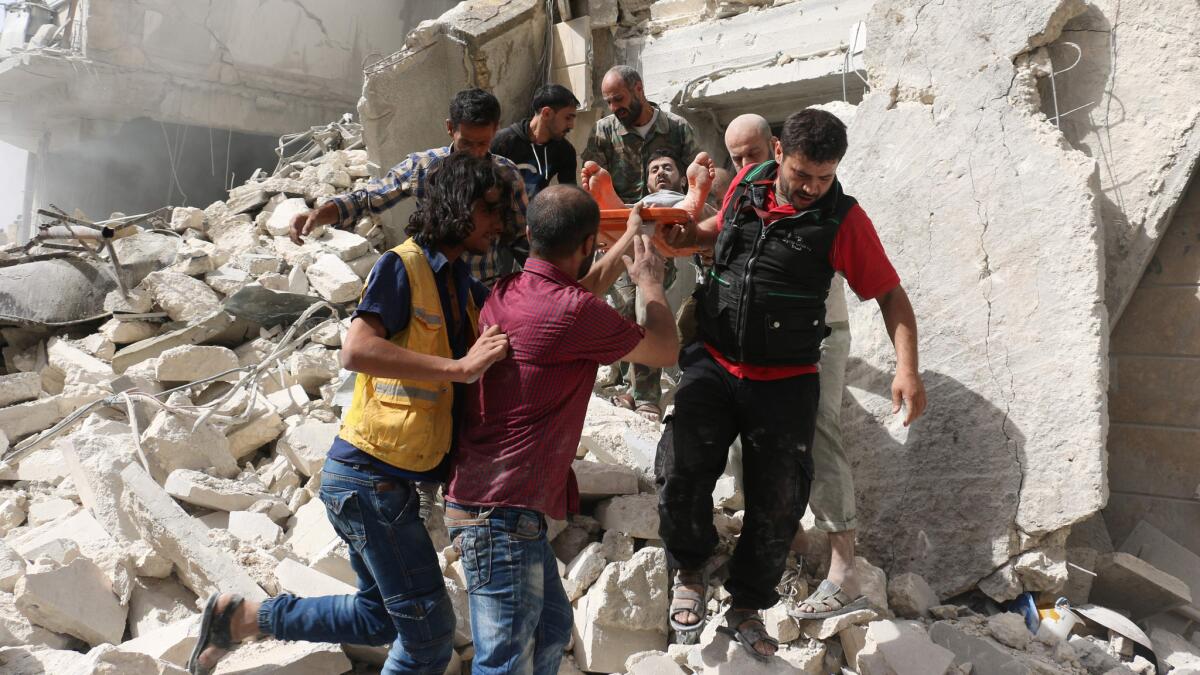Editorial: Cease-fire is still the least bad option for Syria

- Share via
Secretary of State John Kerry has been indefatigable in pursuing a negotiated cease-fire in Syria. So it was especially depressing Wednesday when Kerry confessed in a speech at the United Nations that he entertained “profound doubt” about whether Russia and the government of Syrian President Bashar Assad were serious about living up to their commitments to reduce violence and make it possible for humanitarian aid to be distributed.
In caustic remarks at a session of the U.N. Security Council, Kerry ridiculed Russia’s shifting explanations for the shocking attack Monday near Aleppo on a convoy of trucks carrying food, water and medical supplies. At least 20 and maybe as many as 30 people were killed in the attack, which U.S. officials privately have blamed on the Russian air force but which the U.S. would consider Russia’s responsibility even if the Syrian air force was involved. (The Russians have denied responsibility, claiming at various points that the convoy was targeted by mortar fire and that an American drone was seen in the vicinity.)
Kerry contrasted the Russians’ denials with the prompt admission by the United States that it had accidentally bombed Syrian soldiers last Saturday, mistaking them for Islamic State fighters: “We did it, a terrible accident. And within moments of it happening, we acknowledged it. We didn’t put out a bunch of obfuscating facts.”
During the week before it collapsed, the cease-fire did lead to a reduction in violence.
“The future of Syria is hanging by a thread,” Kerry told the Security Council. But he also urged the parties, including Russia, to revive the peace process by grounding aircraft in “key areas” where humanitarian aid would be delivered. That would presumably be followed by observance of other provisions of the agreement reached by the U.S. and Russia on Sept. 9. They include, after a period of time, coordinated air strikes by the U.S. and Russia on Islamic State and on the Front for the Conquest of Syria, a group with ties to the Al Qaeda affiliate formerly known as the Al Nusra Front. Eventually negotiations would be take place on the “political transition” called for in a series of U.N. Security Council resolutions.
Frustrating as the diplomatic process has been, Kerry is right that there are no good alternatives — particularly for the United States, which rightly has made its priority in Syria the defeat of Islamic State, not the ouster of Assad. Diplomacy also remains the best option for relieving the suffering of the Syrian people.
During the week before it collapsed, the cease-fire did lead to a reduction in violence. Kerry is right that it needs to be reinstated and reinforced, and he is right to shame the Russians for failing to live up to their commitments. The rest of the Security Council needs to keep up the pressure.
Follow the Opinion section on Twitter @latimesopinion and Facebook
A cure for the common opinion
Get thought-provoking perspectives with our weekly newsletter.
You may occasionally receive promotional content from the Los Angeles Times.






